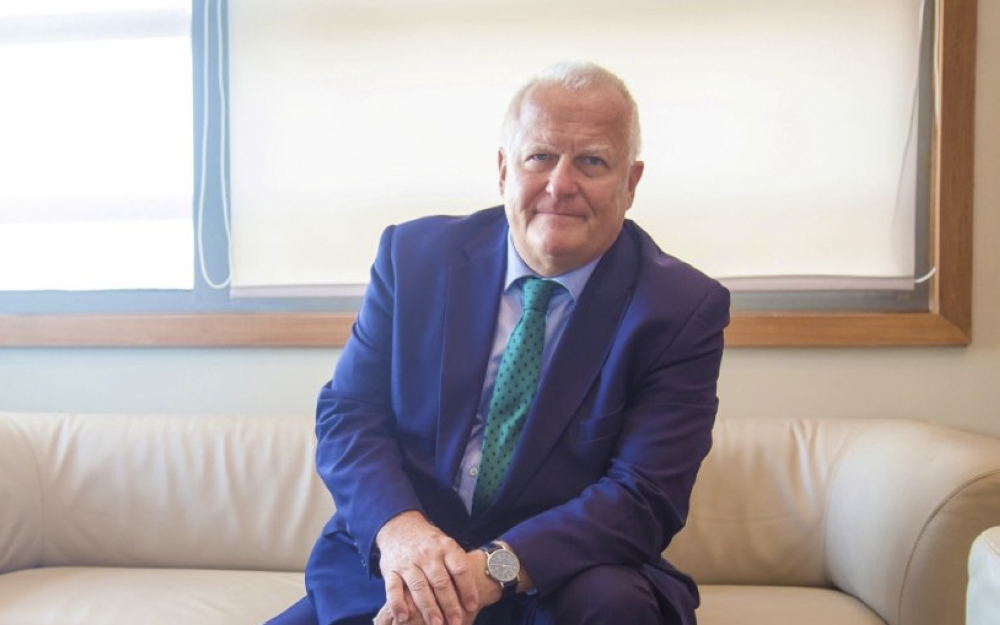
There is “no humanitarian crisis” in AFC/M23-controlled Goma, according to a seasoned German ambassador
Goma, the capital of the Alliance Fleuve Congo (AFC) rebellion-captured North Kivu Province in eastern Democratic Republic of the Congo (DRC) in January, is not experiencing a humanitarian crisis, according to Peter Fahrenholtz, a former German ambassador to Rwanda. Fahrenholtz has visited the rebel-controlled city and discussed the situation with the deputy governor of the province and other officials.
Fahrenholtz, who was Germany’s ambassador to Rwanda from 2012 to 2016, said on April 13 that his conversations with Willy Manzi, the deputy governor, provided insight into the region’s circumstances. After traveling around the majority of the city, he once more took to X on Tuesday, April 15, to express his impressions.
The rebels reported and denounced a firefight that took place on Friday, April 11th, and claimed it was the consequence of “a series of joint military operations” conducted by the Southern African Development Community (SADC) forces in cooperation with the Congolese army (FARDC), the Rwandan genocidal militia known as the FDLR, and Congolese ethnic militia known as Wazalendo [Swahili for patriots] in and around Goma. Rwanda is also in danger from the FDLR, a UN-approved organization established in 2000 by former leaders of the 1994 Genocide against the Tutsi.
Goma is not experiencing a humanitarian crisis, Fahrenholtz stated. I saw no indications of a humanitarian disaster when driving across the majority of the city. The streets are crowded with people, and they appear to be at ease and secure. Food items and imported goods abound in the stores. The municipality provides water and electricity around-the-clock, and the university has reopened. Even at night, there is street illumination. The streets are almost completely free of trash. Crime and corruption appear to be on the decline, and police officers are carrying out their duties. The establishment of the rule of law is starting.
Tribalism, corruption, and genocidal violence against Congolese Tutsi villages targeted by the FDLR, which is sponsored by the DR Congo, are among the issues that the AFC/M23 insurrection seeks to eradicate.
On March 28, an agreement to withdraw Southern African forces from DR Congo was signed between the rebels and the SADC mission.
The SADC Secretariat has refuted the AFC/M23 rebellion’s assertions that on April 11, its soldiers in DR Congo carried out “a series of joint military operations” in cooperation with the FDLR, Congolese ethnic militias, and the Congolese armed forces in and around Goma.
In his earlier comments on the DR Congo issue, the German diplomat—who also served in Bangladesh and Eritrea—questioned the European Union’s silence about the conflict’s deployment of European mercenaries.
Additionally, he drew attention to the Congolese government’s inability to address the root causes of the AFC/M23 insurgency as well as the long-standing problems of genocidal ideology and divisionism that have resulted in the decades-long persecution and expulsion of Tutsi communities in eastern DR Congo.
In a March 10 post on X, EU High Representative Kaja Kallas accused Rwanda of supporting the rebels, a statement Fahrenholtz questioned.
Do M23 members not belong to the Democratic Republic of the Congo? Did European mercenaries not fight with them in the Democratic Republic of the Congo? He asked, “Who is going to defend ethnic minorities in eastern DR Congo?”
The rebels emphasized last week their concerns about ongoing “systematic” violations of human rights and violations of a ceasefire agreement that was previously established in areas they had departed in an attempt to promote peace negotiations. Their pledge was to “neutralize any threat at its source” in reaction to the onslaught raging.
The town of Walikale, located roughly 130 kilometers northwest of Goma, was taken over by the rebels on March 19. However, they later chose to leave the area in order to implement a unilateral ceasefire that was announced on February 22 in support of peace initiatives meant to promote communication and address the underlying causes of the conflict in eastern Democratic Republic of the Congo.
All Categories
Recent Posts
Tags
+13162306000
zoneyetu@yahoo.com



